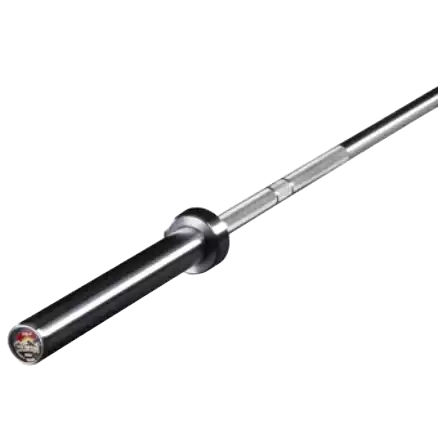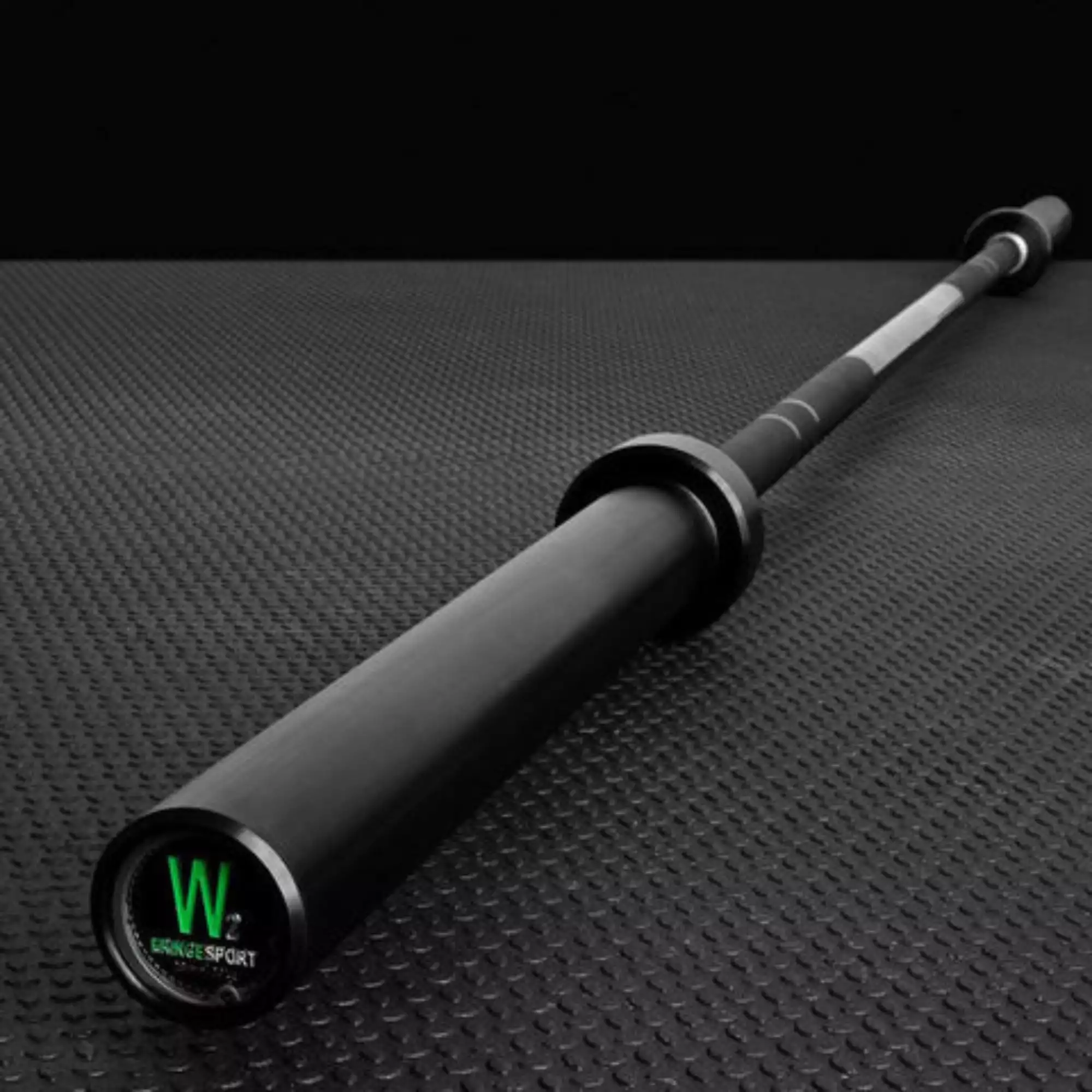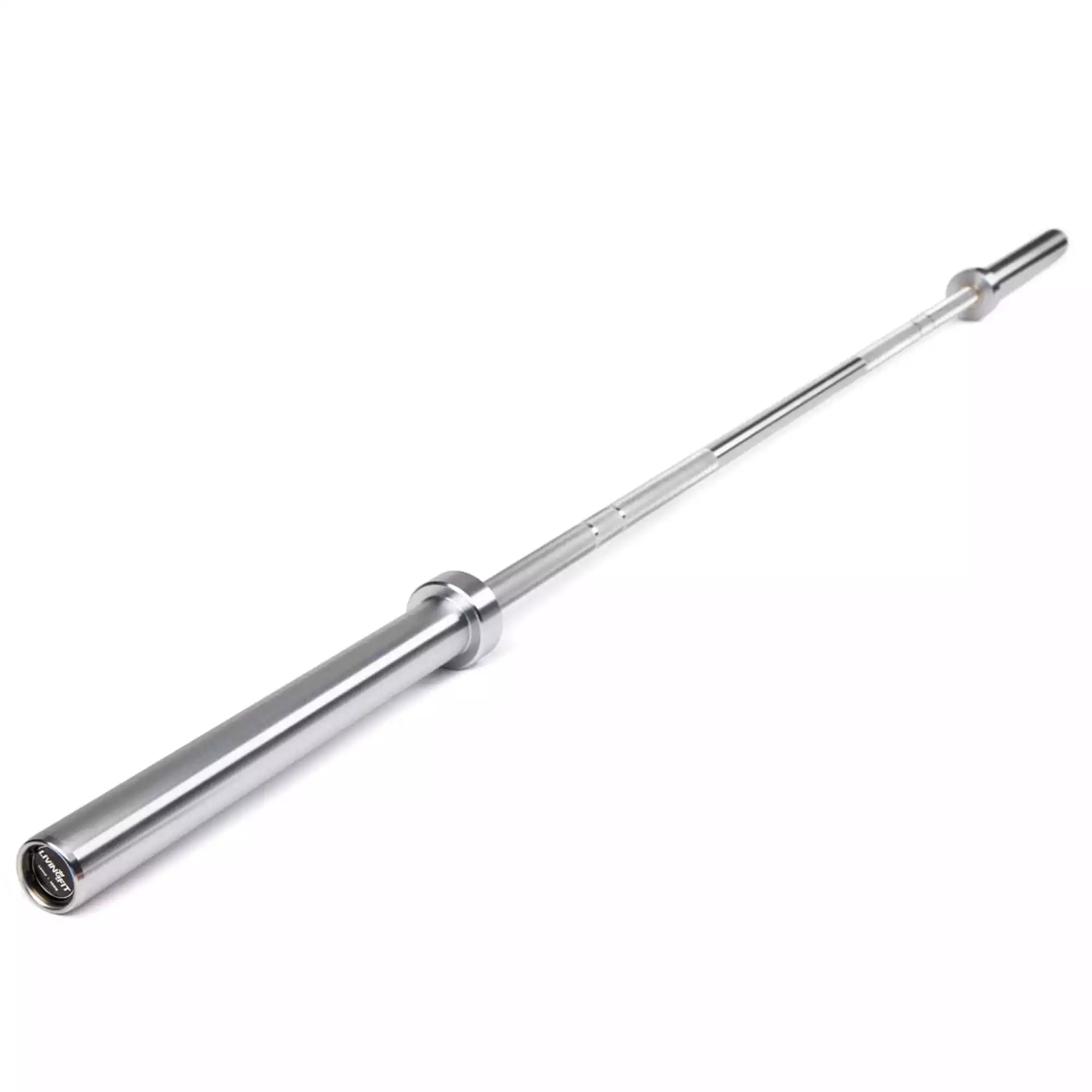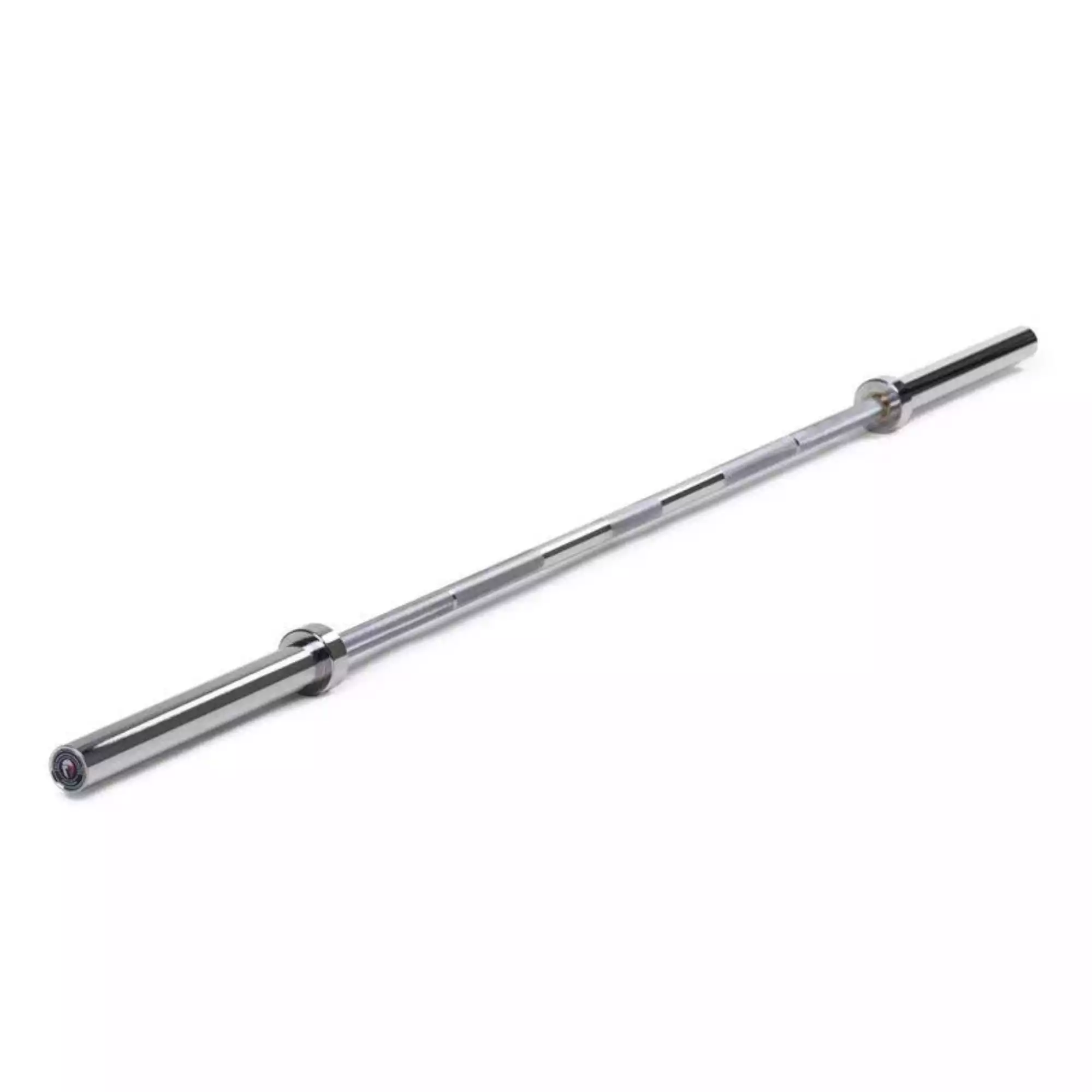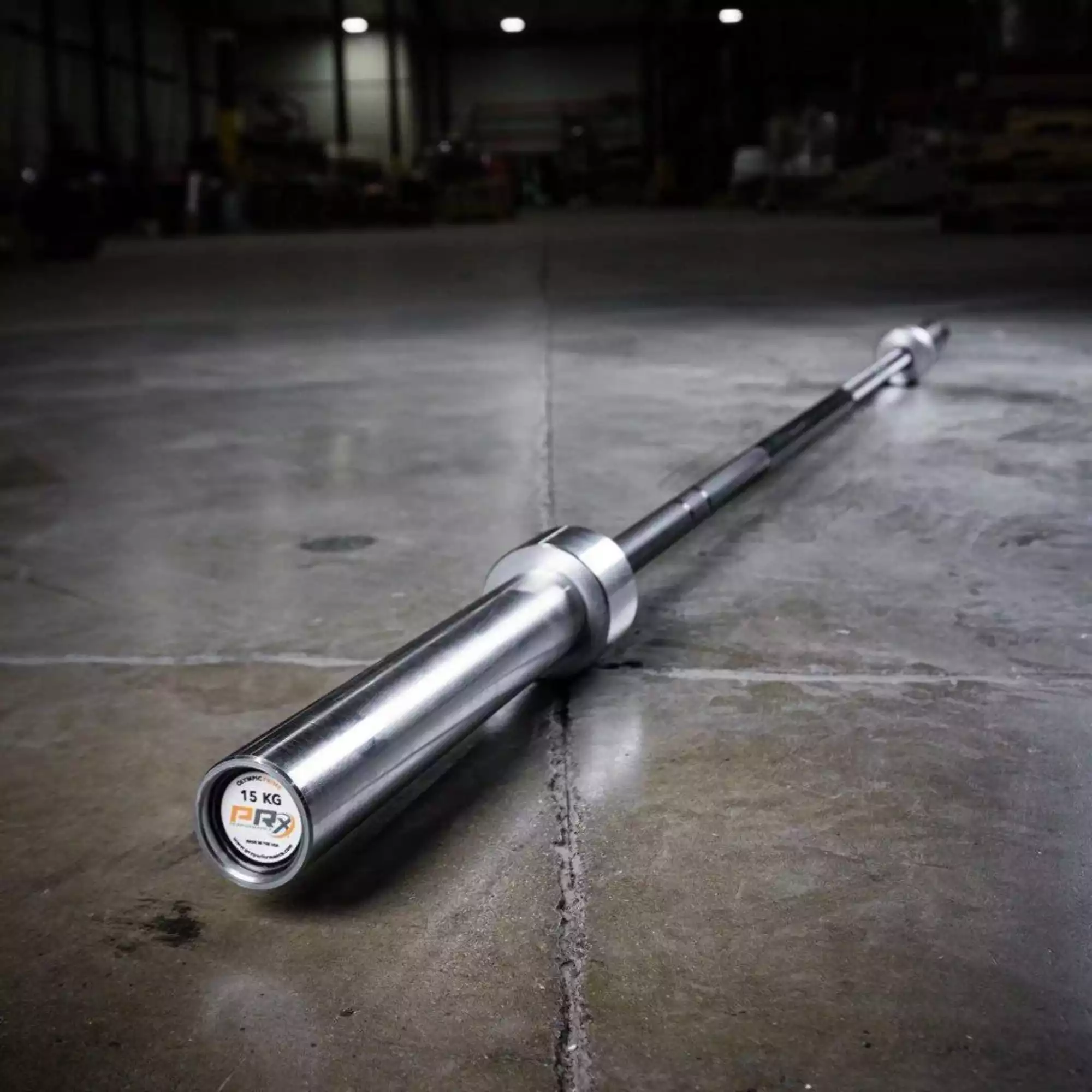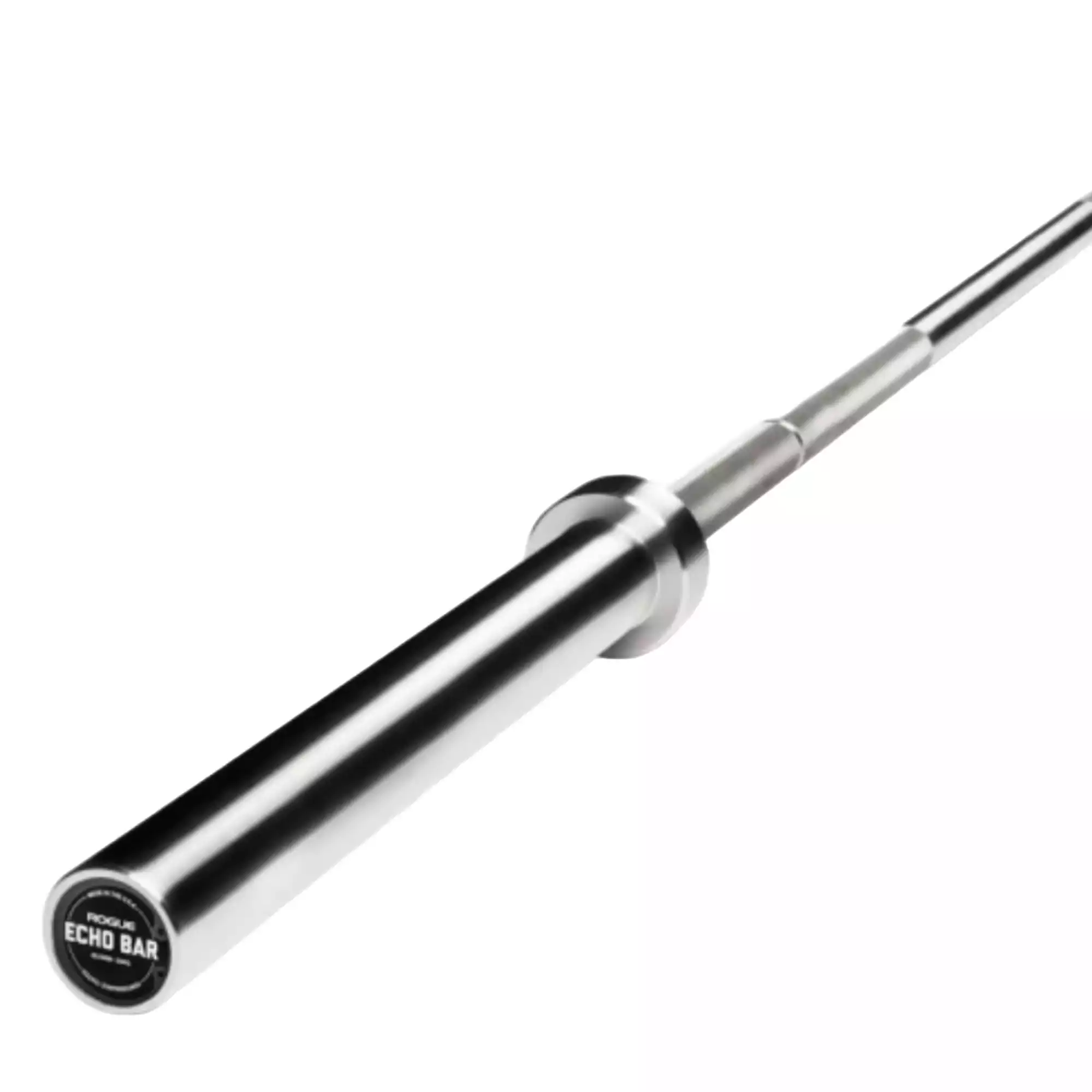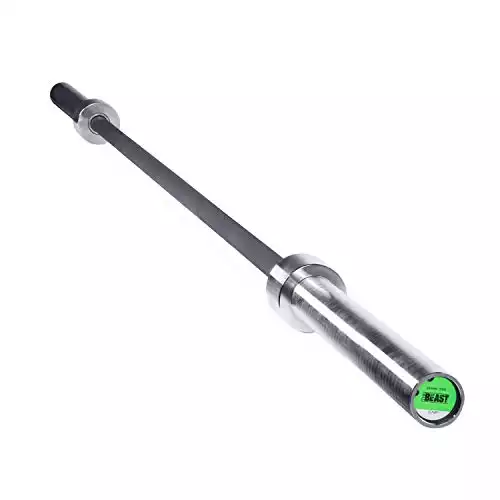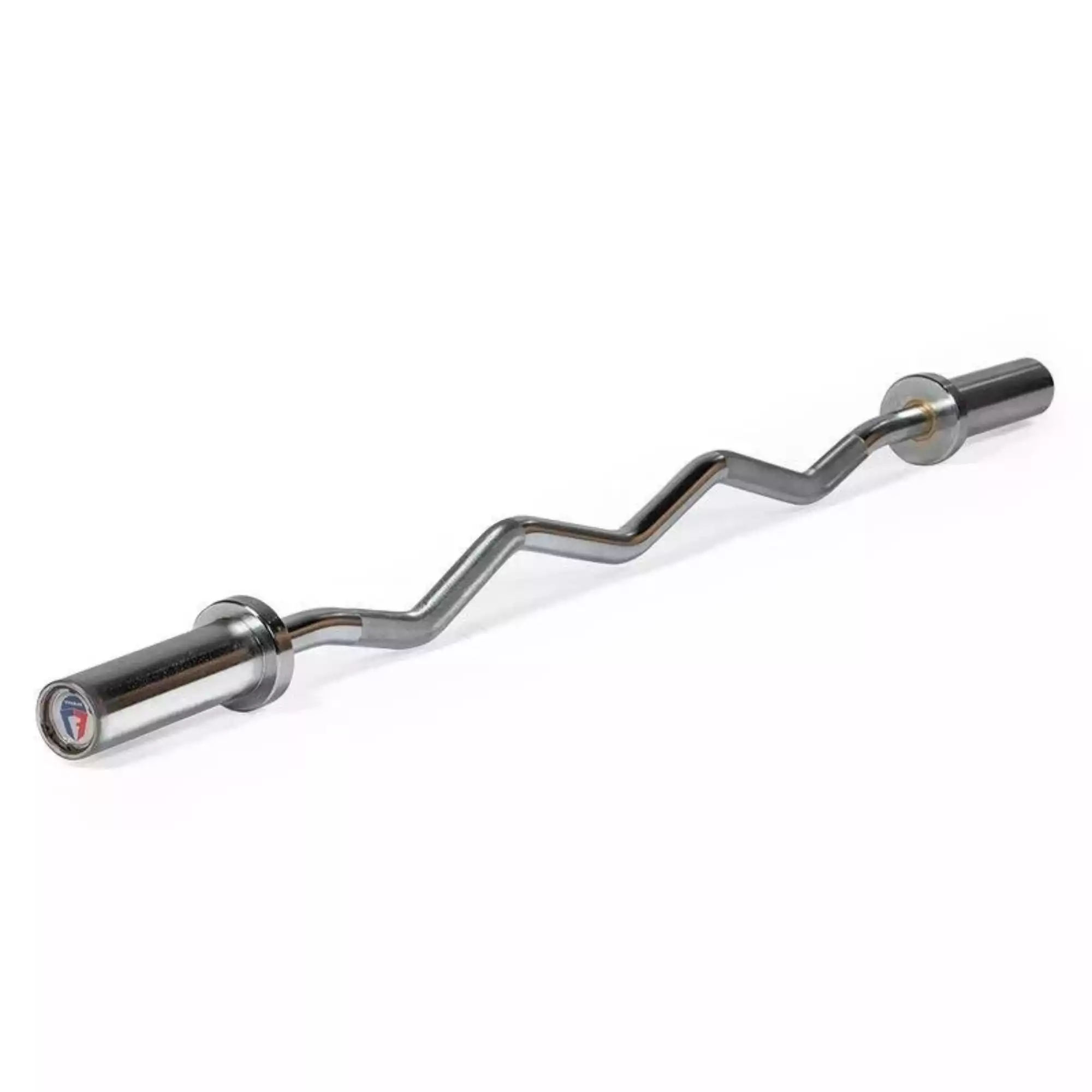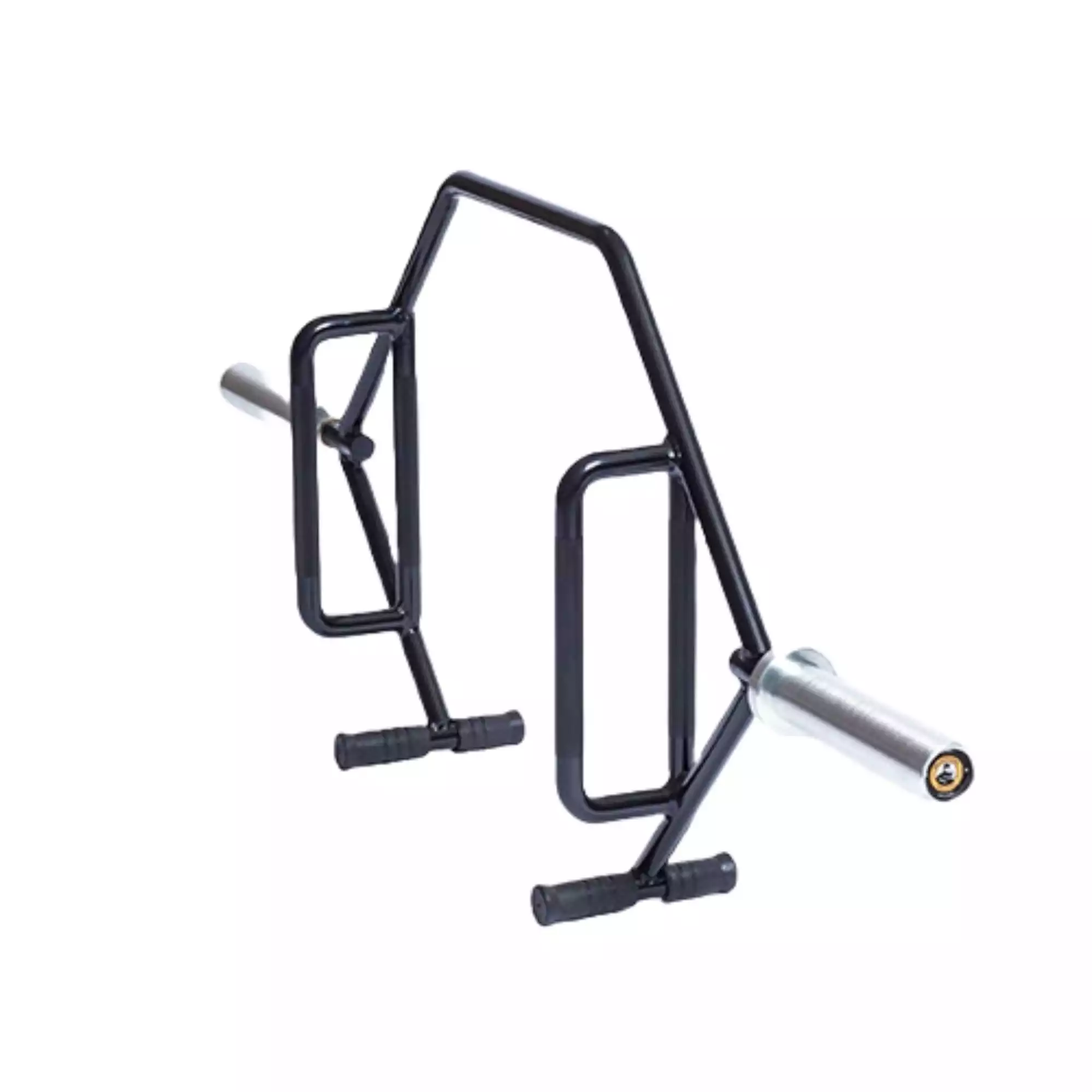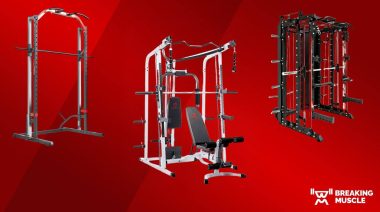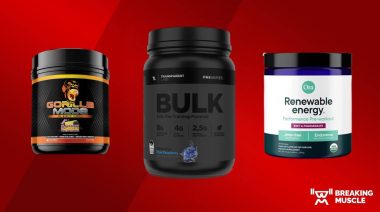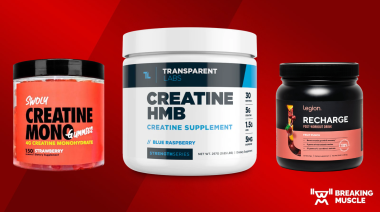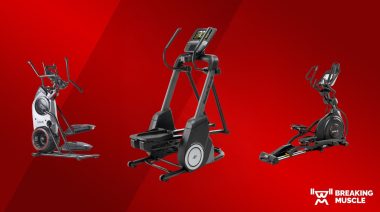So, you need a reliable barbell that won’t break the bank?
It might seem straightforward, but the market is flooded with hundreds of budget-friendly bars, all claiming to be the best. It would take weeks to sort through all the options. And let’s be honest, the last thing you want is a bar that falls apart on you within a couple of years.
Don’t worry; we’ve done all the heavy lifting for you. We’ve combed through the vast sea of options, tested the contenders, and narrowed them down to the nine best budget barbells.
Over the past eight years, I’ve used many barbells in different CrossFit gyms and my garage gym — putting them through high-rep workouts, heavy strength training, and everything in between. I’ve also been a fitness writer and editor for almost three years and have spent countless hours researching the best barbells for various uses, including powerlifting, Olympic weightlifting, and more.
With my first-hand experience and the rigorous product testing at our physical testing facility (more on that below), I’m confident that you’ll find one of these best budget barbells to be a winner for you.
How We Chose the Best Budget Barbells
Choosing the best budget barbells is no easy job, but we’ve gone to great lengths to ensure that our recommendations are top-notch.
Our dedicated team of product testers includes CrossFitters, strength and conditioning coaches, certified personal trainers, and fitness enthusiasts who have used barbells in home gyms and commercial facilities. Pulse Beat Fit also has a testing warehouse in Springfield, MO, where we conduct rigorous testing processes on barbells from reputable brands like REP Fitness, Rogue, Titan, and more.
Out of the dozens of bars we tested, we chose the best nine barbells based on their overall construction, tensile strength (how much weight a barbell can hold before it breaks), knurling type, sleeve spin, and coating durability. But we didn’t stop there. We also considered the brand’s reputation, the packaging it arrived in, its overall versatility, and whether or not we think it’s worth the cost.
Our Top Picks for the Best Budget Barbells
- Best Budget Barbell Overall: REP Colorado Bar
- Best Budget CrossFit Barbell: Fringe Sport Wonder Bar
- Best Budget Olympic Barbell: Living.Fit Barbell
- Best Budget Powerlifting Barbell: Titan Performance Series Power Barbell
- Best Budget Women’s Barbell: PRx Women’s Olympic Prime Bar
- Best Budget Barbell From Rogue: Rogue Echo Bar
- Best Budget Barbell on Amazon: CAP Barbell The Beast
- Best Budget Curl Bar: Titan Olympic EZ Curl Bar
- Best Budget Trap Bar: Bells of Steel Open Trap Bar
Best Budget Barbell Overall: REP Colorado Bar
Pros
- Highly versatile mixed-use bar
- High weight capacity
- Cerakote coating option
- Many color combos
- Well packaged
Cons
- No center knurl
- Chrome has a lower lifespan
- More expensive
The standout feature of the REP Colorado Bar is that it’s mixed-use. Being mixed-use means it’s suitable for powerlifting and Olympic weightlifting — sports that typically use two separate barbells with different diameters, knurling, and whip (how much the barbell will flex before it becomes permanently bent). This is also the reason we consider it the best budget barbell overall and why we rated it 4.5 stars out of 5 after testing it.
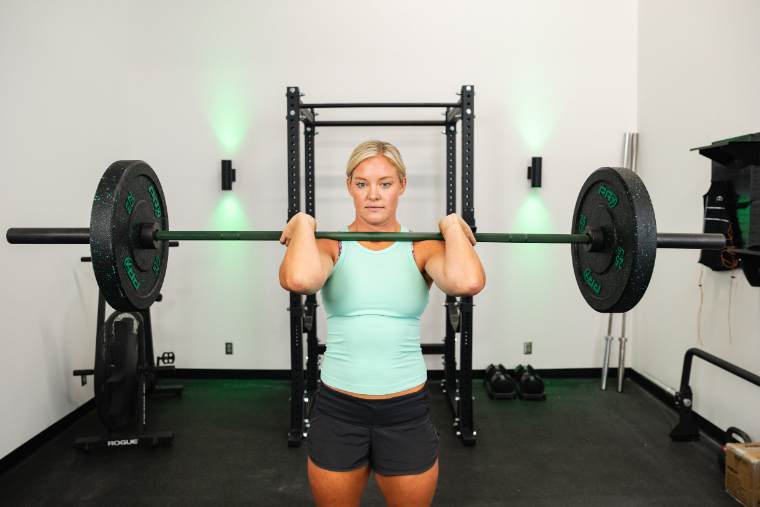
A mixed-use barbell combines the best features of a powerlifting and weightlifting bar: a Goldilocks 28.5-millimeter diameter shaft, composite bushings for a smooth spin, and dual knurl markings. The dual knurl rings make it easier for you to ensure your grip is even for various movements, such as the bench press or snatch.
The Colorado bar is also a huge asset if you’re a home gym user like me since it allows you to engage in multiple training styles with a single tool. You’ll save space and money because you only need to invest in one bar instead of two.
The staff at Pulse Beat Fit noticed that this bar has a finely done volcano knurling, which offers more surface area contact between your hands and the bar for improved grip, and rated it 4.5 stars out of 5. They mentioned that the knurling stops before it gets to the bushing and feels like just the right amount of aggressiveness for a secure grip without chewing your hands up during high-rep workouts.
This bar has no center knurling, which is a drawback if you want to use it regularly for back squats because the bar will be less grippy. If you still decide to invest in this bar despite the lack of center knurl, consider chalking your back before each set or wear a sticky shirt that offers a similar level of grip to ensure you stay safe.
The Colorado bar comes in two finishes, one of which is chrome plated. According to one of our product testers, the chrome version is not the best choice if you intend to put this bar in a CrossFit gym. Chrome coatings can reduce the longevity of a barbell by up to 50 percent.
That said, the hardened chrome version will likely perform without issue in a home gym, where it should last about 30 years because it will get significantly less use than at a commercial facility.
The other finish is Cerakote, which we think is a serious plus on the Colorado Bar. Cerakote is a special coating popular in the firearm community as it helps avoid rust build-up. On the Colorado Bar, its thin application adds a touch of durability without affecting the feel of the knurling. We also love that it’s available in five colors — red, green, black, blue, or white — so you can match the barbell to your other gym equipment, such as your favorite weight bench.
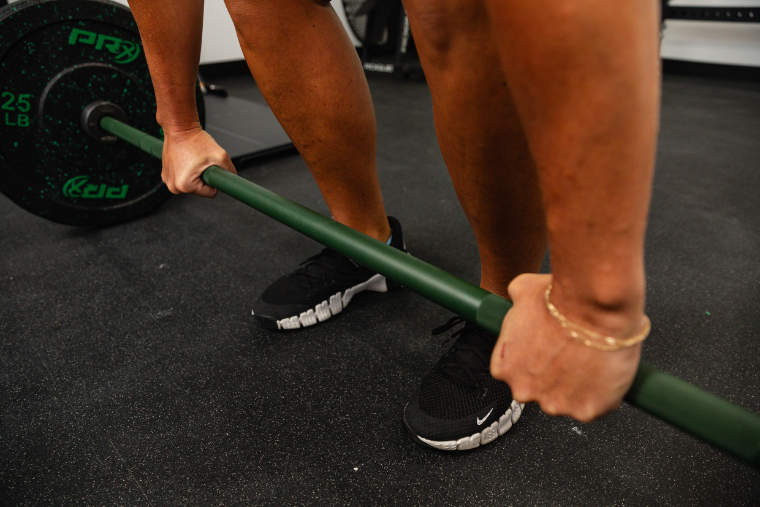
Finally, this is one of our list’s most expensive budget barbells. At the time of writing, this bar retails for around $330, which might put it out of reach if your wallet is running extra-lean. We knocked a few points off for this reason and rated it 4 out of 5 stars for price. However, if you are willing to spend a bit more and like to dabble in various styles of lifting, we think the Colorado Bar is worth it.
For more, check out our full REP Fitness Colorado Bar review.
Best Budget CrossFit Barbell: Fringe Sport Wonder Bar
Pros
- Multi-purpose use
- Your choice of bearings or bushings
- 1,600-pound capacity
- Great price-to-value
Cons
- Black zinc finish can fade
- Only one coating offered
- Sleeves show wear & tear
Like the REP Colorado Bar, the 20-kilogram (44-pound) Wonder Bar is a multi-purpose barbell. Many features make it the best choice for CrossFit, where you frequently alternate between powerlifting, Olympic weightlifting, and specialized movements like thrusters.
First, the Wonder Bar has a 28-millimeter shaft diameter, ideal for using the hook grip in Olympic weightlifting and comfortable for almost all hand sizes. (If you’re a female CrossFitter or have small hands, you can also opt for the 15-kilogram Wonder Bar with a 25-millimeter diameter.) The shaft has dual markings for powerlifting and Olympic weightlifting, meaning you don’t need to swap out your barbell when you switch between either training style.
The Wonder Bar also has an impressive 205k pounds per square in (PSI) tensile strength capacity, which means it can withstand the high volume of drops seen in a CrossFit box. I was pleasantly surprised to see they even show the yield strength (160k PSI), something few companies will ever disclose.
The 20kg Wonder Bar is unique because it offers two sleeve versions: bushings or bearings. Bushings are better for slower and heavier lifts like power lifts (squats, bench presses, and deadlifts). They’re also more affordable, more durable, and easier to maintain.
On the other hand, bearings are better for the faster lifts and lighter loads seen in Olympic weightlifting. They’re smoother and spin extra fast but require more care and upkeep. The type of bar you choose depends on your lifting style and preference. The great thing is, regardless of the kind you choose, you’ll still get an incredible 1,600-pound weight capacity.
One of the main drawbacks of the Wonder Bar is that its black zinc finish is the only option offered. Even though the jet-black color is dazzling, I’d appreciate more color options to inject some personality into your home gym. Different finishes also provide higher levels of protection to the bar, like stainless steel, which is more resistant to rust and abrasion. The Wonder Bar doesn’t cater to these preferences, limiting its appeal and adaptability to various training environments.
More importantly, the black zinc finish can fade over time, especially with frequent use and if you store it in a non-climate-controlled location. I have a different barbell with a black zinc finish, and it looks pretty beat up because the coating has faded so much.
Similar to the fading of the shaft finish, the sleeves can also show some wear and tear over time. That same black zinc finish is applied to the sleeves, which will experience metal-on-metal contact as you slide your weight plates on and off.
A customer expressed this in their review by saying, “…the only complaint I have is that the sleeves have already shown some good cuts in the metal from dropping the bumpers.” I’ve seen this same effect with barbells with Cerakote coatings applied to their sleeves — there’s simply no way to keep them looking beautiful after day one.
Best Budget Olympic Barbell: Living.Fit Cerakote Barbell
Pros
- Well-designed for Olympic lifting
- Reasonably priced
- Grippy but comfortable knurling
- Backed by a lifetime guarantee
Cons
- No center knurling
- May rust or corrode if left in a non-climate-controlled room
- No 15-kilogram option available
The Living.Fit Barbell has dual knurl rings, so it’s not strictly a weightlifting bar — a true Olympic weightlifting bar will only have single knurl marks based on International Weightlifting Federation (IWF) standards. Still, we consider it the best budget Olympic barbell because it has a 28-millimeter shaft diameter per IWF standards, and its construction makes it strong enough to withstand repeated drops. Our testing team tried this barbell for several weeks and rated it 4 out of 5 stars overall.
Besides a couple of bushings, most of this bar’s components are high-quality needle bearings. Needle bearings are essential for an Olympic bar because they allow it to spin quickly and smoothly. This reduces the torque on your wrists, elbows, and shoulders during snatches and clean and jerks and helps you avoid injury.
However, we only gave the rotation system 3 out of 5 stars because the sleeves don’t spin quite as fast as other barbells we’ve tried, especially those from premium brands like Eleiko. (To be fair, though, we do think the sleeve spin is decent for a barbell at this price point.)
The Living.Fit Barbell is made with high alloy steel. In our experience, this material is suitable if you store your barbell in a climate-controlled room. But if your garage or basement tends to get humid, you’ll need to be meticulous about keeping the barbell clean. Not wiping the chalk and sweat out of it when you’re done training may cause it to rust or corrode faster.
After we tested the Living.Fit Barbell, we gave the knurling 4 out of 5 stars. It has a depth of 1.2 millimeters, and we were able to get an excellent grip without having our hands chewed up. However, there wasn’t anything special about the knurling that stood out to us.
Similar to other options in this article, the Living.Fit Barbell lacks a center knurling. This is fine if you plan only to use it for Olympic lifting exercises, but it isn’t the greatest if you have a special love for back squats. The lack of a center knurl means the bar will be more likely to slip around on your back during high-bar squats. It will also make low-bar squats challenging because they rely on the bar gripping your shirt to stay in place.
RELATED: Low-Bar Versus High-Bar Squats: What’s the Best Lower-Body Builder for You?
For a high-quality barbell, the Living.Fit Cerakote Barbell is well priced at just under $200. We rated its overall value 4.5 out of 5 stars because of its high tensile strength of 200k PSI and lifetime warranty (covering the bar against any material, functionality, or workmanship defects throughout its lifespan).
Best Budget Powerlifting Barbell: Titan Performance Series Power Barbell
Pros
- Center knurling
- 29mm diameter shaft
- Aggressive knurling for a better grip
- Serious 1,500-pound capacity
Cons
- Single knurl marks only
- Aggressive knurling can hurt
High-quality powerlifting barbells can cost several hundred dollars, but the Titan Fitness Performance Series Power Barbell is an affordable option at around $150.
It features a 29-millimeter shaft diameter, which may seem unimportant, but if you’re a powerlifter (even an aspiring one), you should train like you compete. The International Powerlifting Federation (IPF) uses 29-millimeter diameters as the standard in their competitions for male competitors. By using the same diameter in your training as your competitors, you’ll gain an edge over the other lifters. At the very least, your grip will improve when lifting on a 29-millimeter bar versus a 28-millimeter barbell.
The center knurling of the Performance Series Power Barbell gives you a better grip on squats, especially if you’re a low-bar squatter, because it results in more contact area between the bar and your shirt (or back if you’re addicted to pain). It also comes in handy for sumo deadlifts, as you’ll have a knurled area to grip, unlike many of the non-center-knurled alternatives I’ve mentioned.
This power bar also flexes some of the coarsest knurling out of all the bars featured in this article. It has medium mountain knurling, which is noticeably more aggressive than volcano knurling. The sharp tips of the former type are still present and will dig deeper into your hands. For a powerlifting bar, aggressive knurling is good — the last thing you want on a one-rep max attempt is to end up dropping the bar because the knurling was too passive.
A drawback to this bar is that, being a power bar, it only has powerlifting knurl marks and isn’t suitable for other sports like Olympic weightlifting or CrossFit. I’ve tried Olympic lifts with a powerlifting bar before, and it was not a comfortable experience. The knurling is too sharp, the bar is too thick, and there’s just not enough whip, so you won’t want to Oly lift with this bar. In this way, it’s the opposite of the Rogue Echo Bar (reviewed below), which features Olympic lifting marks only.
Similarly, the aggressive knurling might not appeal to those with sensitive hands. Mountain knurling can be uncomfortable to hold and downright painful on your back when performing squats. Although your skin will develop callouses to protect itself from the coarseness, some people might find lifting with this bar an unpleasant experience.
RELATED: Best Squat Racks for Small Spaces, Beginners, and More
Best Budget Women’s Barbell: PRx Women’s Olympic Prime Bar
Pros
- Made for smaller hands
- Lighter 15-kilogram starting weight
- Medium knurling is just right
- Dual knurl marks
- Made in the USA
Cons
- No center knurl
- Black zinc can fade
The PRx Women’s Olympic Prime Bar is the best barbell for women for several reasons. First, it has a 25-millimeter shaft diameter. Not only does this match the IWF sizing for women’s barbells, but it’s also ideal for ladies because women have smaller hands than men on average, making a typical 28- to 29-millimeter barbell challenging to hold. A smaller diameter on a barbell also means less stress on your wrists, elbows, and shoulders, which is good for reducing injury risk.
This barbell also has a lighter 15-kilogram starting weight, the official starting weight for a barbell used in any IWF competition. This weight is a suitable warm-up or starting weight for women of all strength levels for exercises like the bench press and back squat. However, it also makes for a more reasonable load on exercises that recruit less muscle mass, like the overhead press and barbell rows, where technique might suffer if a 45-pound barbell is used as your first set.
Finally, the bar also has a medium knurling. Medium volcano knurling is an excellent balance between grip and comfort. It’s not too shallow or aggressive, giving just enough grip without turning your hands into a calloused glove. It’s also more tolerable for the snatch and clean and jerk because it won’t tear your skin as the barbell rotates in your hands.
Unlike many all-purpose or powerlifting barbells, the PRx Olympic Prime Bar does not have a center knurling. This is excellent for Olympic lifting exercises since it can save the skin on your throat and collarbones, but it’s not ideal if you like to back squat heavy often. Without a center knurl, the bar can slide around on your back, especially on low-bar squats because they require assistance from the bar’s knurling to stay in place.
The black zinc coating can lose its color over time, mainly if you use it often and keep it in a place that isn’t temperature-controlled. At many of the CrossFit gyms I’ve trained at, black zinc barbells were very common, and almost all had the coating rubbed off near the middle of the bar from extensive use. For this reason, I would not suggest black zinc coatings if you are concerned about how your bar looks and expect it to look brand new for years to come.
Best Budget Barbell From Rogue: Rogue Echo Bar
Pros
- Reasonably priced Rogue option
- Excellent for Oly lifting
- Made in the USA
Cons
- Single knurl marks only
- Bright zinc finish can fade
Rogue Fitness is known for its top-tier quality (and higher prices), but the Echo Bar is a reasonably priced barbell that should meet your high expectations when buying a Rogue product. At around $266, this bar is significantly lower than other Rogue barbells, which can range as high as $700 or more. Thanks to the economical pricing, you can get a high-quality barbell from a reputable brand without breaking the bank.
The Rogue Echo Bar is an excellent barbell for Olympic lifting. It has all the essential features you’d expect from a weightlifting-specific bar. It has no center knurl to save the skin around your shins, hips, and neck. The single knurl marks are for easy and repeatable hand placement on the shaft, ideal if you’re just getting into Olympic lifting and don’t know the difference between powerlifting and weightlifting knurl marks. It also has an F8-R rating on Rogue’s F-Scale, putting it around the middle of the pack for durability — pretty solid considering its budget-friendly price.
Rogue’s Echo Bar is USA-made, a defining feature that distinguishes it from the other options in this article. Budget barbells are affordable because they are imported from overseas, where workers don’t get compensated as well and manufacturing standards are lower. However, you’re supporting local workers and generally receive higher-quality items when you buy USA-made products, something to consider if you can spare the extra cash.
Like black zinc coatings, bright zinc finishes can fade over time. Whether from wear and tear, humidity, or large temperature swings, these can cause the finish to wear off sooner than expected. While this won’t affect the durability of the bar, it will look less appealing and require more maintenance because the bare steel will be exposed and subject to faster rust build-up.
Lastly, this barbell doesn’t feature dual knurl markings. In my opinion, I’d love to see a set of powerlifting hash marks, as I think it would increase the bar’s versatility for a wider audience. That said, it’s made explicitly for Olympic lifting, so if you’d prefer a bar with dual markings, consider the REP Colorado Bar instead.
RELATED: Best Weightlifting Belts
Best Budget Barbell on Amazon: CAP Barbell The Beast
Pros
- Very affordable at around $100
- Respectable 1,200-pound capacity
- Highly rated (4.7 out of 5 stars) by more than 4,330 customers
Cons
- Low 110k PSI capacity
- Black phosphate finish can fade
CAP Barbell’s The Beast, which you can find on Amazon, is hands-down the most affordable budget barbell on our list. At around $100, its price tag is significantly lower than almost any other Olympic barbell on the market, which tends to cost $200 to $300, if not more. With The Beast, you get a decent barbell from a reliable seller without spending much money.
The Beast barbell has a maximum weight capacity of 1,200 pounds, which is impressive for any budget barbell but especially for one priced so economically. And let’s be honest, most of us (myself included) aren’t going to be lifting anywhere near its maximum weight capacity. So, the fact that it has a capacity of over 1,000 pounds while staying budget-friendly is a win-win.
Although its product page on Amazon appears to host at least five different bars offered by CAP Barbell (including The Beast), I was shocked to see the high ratings. Typically, you’d expect 3 out 5 stars for a barbell in this price range, but CAP Barbell has over 4,300 reviews with an average rating of 4.7 out of 5 stars. Buyers speak highly of the knurling, which they say is grippy without being too aggressive, and smooth sleeve rotation. With the positive feedback and praise this barbell received in the review section, you likely won’t regret your investment.
The main drawback I see with The Beast is its lower tensile strength of 110k PSI. This is definitely lower than all the other barbells in this article, meaning it would be the first to bend if our product testers were to put it through a maximum loading test. That said, you’re unlikely to encounter bending or breaking issues unless you’re a world-record powerlifter or weightlifter. For general-purpose strength training, this bar will still serve you well.
Like black zinc, this bar’s black phosphate finish can fade. This protective layer wears off because of friction, moisture, or temperature fluctuations. This won’t affect the steel’s quality or the bar’s maximum capacity but will make it look less attractive. Wiping the bar down with a towel and keeping it dry after each use can help prolong its coating.
Best Budget Curl Bar: Titan Olympic EZ Curl Bar
Pros
- Allows for specialty exercises
- Affordably priced at $84.97
- Well designed for the price
Cons
- Lower 200-pound capacity
- Can’t be racked in a power rack
The most significant benefit of Titan’s EZ Curl Bar is that it allows you to perform specialty exercises that tend to be uncomfortable on a straight Olympic bar. For example, EZ bar curls, skull crushers, preacher curls, laying tricep extensions, and more allow you to target your biceps, triceps, forearms, and shoulders without the usual joint strain that you’d experience when using a straight bar. Because of its versatility, an EZ Curl bar is often the first specialty barbell I recommend for home gym owners.
The Titan Olympic EZ Curl Barbell only costs around $85 at the time of publishing, which is much lower than other curl bars — you’d be looking at a minimum of $100 for any alternative that offers the same design. As the most affordable bar in this article, it’s great to know that you can get a solid curl bar from a reputable brand at this price.
Cheap EZ curl bars like to cut corners on their knurling and sleeve mechanisms, but Titan rises above all these shortcomings. Their EZ curl bar has a medium knurling that’s just right for accessory exercises. The angles on the shaft are well-designed to ensure it’s intuitive to use and, when combined with the smooth bronze bushings, is very comfortable on your wrists and elbows when performing exercises like curls and skull crushers. Its compact size of 47 inches in length and 17 pounds in weight makes it easy to store and portable when moving around your home gym.
This specialty bar from Titan has a lower weight capacity of just 200 pounds, less than some of the more expensive curl bars that feature 300+ pound capacities. However, this doesn’t mean that the bar is weak or unsafe. The accessory exercises you’ll most likely perform using this bar won’t put you anywhere near its 200-pound capacity.
Due to its 47-inch length, the Olympic EZ Curl Bar is not rackable in a power rack. Since you can’t place it across the J-hooks of a power rack because it’s too short, you’ll have to load it while it’s lying on the floor. However, this isn’t a big deal, as long as you don’t suffer from chronic back pain. Its shorter size also means you’ll have to lift it into position manually. For instance, you’ll have to place the bar in your lap and hoist it into position for skull crushers instead of simply lifting it out of the J-hooks like you would during a bench press.
RELATED: Best Adjustable Dumbells
Best Budget Trap Bar: Bells of Steel Open Trap Bar
Pros
- Open design allows you to perform more exercises
- Built-in deadlift jack
- Compact frame
Cons
- Shorter sleeves
- Inside is a bit cramped
We have the Bells of Steel Open Trap Bar in our testing facility and put it through several weeks’ worth of workouts. We gave it 4.1 out of 5 stars overall and especially like its durability, construction quality, and the fact that it comes with a lifetime warranty.
The open design allows for more exercises than a close-frame trap bar permits. Besides the typical exercises, variations like single-leg deadlifts, walking lunges, split squats, farmer walks, and bent-over rows can be performed using this specialty bar. The open frame also lets you easily step in and out of the bar, making it safer for accident-prone people.
Having lifted with various trap bars before and experiencing the frustration of trying to load and unload weight plates from them, I consider the Bells of Steel Open Trap Bar’s built-in deadlift jack a serious blessing. The rubber feet on the bottom of the bar allow it to be stood up vertically, allowing you to easily swap your weight plates without holding the bar off the ground. For such a simple design hack, it saves time and energy that you can instead dedicate to your lifting.
Whether you have a space-constrained home gym or you simply want to perform your deadlifts in the corner of a crowded commercial facility, the trap bar’s compact frame takes up less space and makes it easier to move around. With a total length of just 59 inches, it fits nicely on some home gym flooring pieces like a single horse stall mat even when loaded to the end of both sleeves.
The sleeves are only 9.7 inches long, which is noticeably shorter than an average trap bar’s 16-inch sleeves. Shorter sleeves mean that you won’t be able to load as many weight plates on the bar. This isn’t much of a problem with iron plates, but it becomes apparent when you use thick bumper plates. When we tested this trap bar, we could only fit three 45-pound bumper plates on each sleeve, which limits its max loading capacity to around 315 pounds (the bar weighs around 47 pounds).
However, I’ve found that a good workaround is to use one 45-pound bumper plate on the inside and then use iron plates for the remaining weight.
One thing we think could be improved is the knurling. We found it to be pretty passive, which could increase the chances of your hands slipping if you load it with iron plates to the high end of its 700-pound weight capacity. We only rated the knurling 2 out of 5 stars for this reason.
Lastly, the inside of the bar is a bit cramped. With 23.6 inches between the handles, it’s clear that you might feel restricted with your feet if you tend to deadlift with a wide stance or if you’re a larger lifter. I deadlift with a stance that’s about hip-width apart, and I find that my toes bump into the rubber feet because they’re the narrowest point of the bar. We docked a few points off our rating for this reason, giving it 4 out of 5 stars for ease of use.
Benefits of Buying a Budget Barbell for Your Home Gym
Saves Money
Buying a budget barbell can save you hundreds of dollars. Budget bars are much cheaper than high-end barbells but still offer comparable features and performance. You can buy a budget barbell for $100 to $350 that will last you decades, while a high-end bar can easily cost $300 to $600 or more. Plus, the money you save can be used to buy more pieces of quality home gym equipment.
Saves Space
Many budget barbells are designed to be mixed-use or multi-purpose. This is done by combining the best features of powerlifting bars and weightlifting bars into a single barbell. As a result, you can perform heavier exercises like deadlifts and faster exercises like snatches with the same bar — instead of two separate bars — which means you only need a single barbell. One less barbell in your home gym is one less piece of equipment piece to buy, maintain, and store.
What To Consider When Buying a Budget Barbell
Price
When buying a budget barbell, price is undoubtedly the most important consideration. After all, the term “budget“ itself implies that it’s affordable. That said, the price tag often directly reflects the barbell’s quality, durability, and overall performance.
At the time of this writing, the Titan Olympic EZ Curl Bar ss on sale at a modest $84.97. Meanwhile, the REP Colorado Bar retails for $329.99. Clearly, there’s a broad range of prices even within the “budget” category.
Remember, you need to strike a balance, and you don’t have to break the bank just to get a good barbell. Regardless of the bar you choose, this figure should give you a good benchmark to work with and help you decide whether you’re getting good value for your money.
Training Style
Training style typically refers to whether you prefer to do powerlifting, Olympic weightlifting, or both — or even another sport like CrossFit. Since these sports have widely different lifts, they benefit from having specific barbells that are made to improve your experience and performance.
For example, powerlifting barbells like the Titan Performance Series Barbell are stiffer, have a larger diameter, and tend to have coarser knurling, a center knurl, and smooth bushings. On the flip side, an Oly lifting barbell like the Rogue Echo Bar has more whip, features a smaller diameter, will have a passive knurling, no center knurl, and fast needle bearings.
Finally, a mixed-use bar like the Fringe Sport Wonder Bar combines the best features of both into a single bar for those days when you just can’t decide.
Bushings vs. Bearings
The choice between bushings and bearings (which refer to the sleeve rotation mechanism) depends on your training style and personal preference.
Snatches and clean and jerks will feel better on your joints with bearings because the sleeves will spin faster. Power lifts like squats, bench presses, and deadlifts will feel smooth with bushings because the exercises have a reasonably straight bar path. In contrast, bearings would force your body to readjust to every technical deviation. A combination of bearings and bushings like you’d find in the REP Colorado Bar is ideal for those who want to dabble in both.
That said, I’ve heard that some elite weightlifters only lift with needle-bearing bars, even when performing heavy squats and deadlifts. The idea is to use the same implement in their training as their competition, regardless of the exercise. This is the exception more than the rule, though.
Knurling
Knurling depends mainly on the type of barbell you use and personal preference. Specialty bars like the Titan Olympic EZ Curl Bar have a more passive knurling, which is sufficient because you typically don’t move super heavy weights for exercises like EZ bar curls. In contrast, powerlifting bars like the Titan Performance Series Barbell have more aggressive knurling to lower the risk of the bar slipping out of your hands or off your back during a max lift.
Beyond this general distinction, knurling becomes very personal. Some like extremely aggressive knurling; others prefer a smooth, almost non-existent hill knurl. There’s no measurement standard for knurling like there is for sandpaper, so if this consideration is a deal-breaker, try to test the barbell before you buy it.
Finish
Stainless steel is the king of finishes because of its resistance to rust and abrasion. Unfortunately, this also makes it the most expensive, so it isn’t on any of our budget barbells.
Bare steel is a classic, where no finish is applied to the bar at all — it’s literally the raw steel that you’re feeling. This makes it great for grip, but there’s no protection from rust, so bare steel barbells often develop a permanent patina look unless you’re a stickler for maintenance.
Black zinc/phosphate is likely the most common. When manufacturers use this coating, they don’t fill in the gaps in the knurling like Cerakote, so you’ll still feel the real steel. Sadly, these finishes wear off over time.
Cerakote is becoming increasingly popular due to its durability and customizability. It’s been used in the firearm industry for decades and can be painted on in various colors and patterns for some seriously cool designs. Cerakote does fill in some of the knurling, so expect to lose a bit of grip from the original bare steel feeling.
Chrome is less common nowadays, and for good reason. Well-made chrome coatings are durable, but they make the bar more brittle and increase its risk of breaking, especially in high-use gyms. Because of this, passing on chrome is the intelligent long-term choice.
Electronic-coating (e-coats) are rare for a budget barbell, but if you find one on sale that meets your other criteria, jump on it. They’re longer-lasting than black zinc/phosphate without filling in the knurling like Cerakote.
Yield and Tensile Strength
Yield strength is the maximum stress a bar can withstand before permanently deforming (bending). Tensile strength is the maximum stress that a barbell can handle before it breaks or fractures. Both of these affect a barbell’s performance and durability.
If you’ve ever seen a “beater bar” in a gym, it’s a barbell used in a power rack for rack pulls because it was pushed past its yield strength — causing it to bend permanently. However, it’s still technically useable because it didn’t break, meaning it hasn’t exceeded its tensile strength (yet).
Warranty
Budget barbells sometimes get a bad reputation for being cheap on all accounts, but that doesn’t mean they can’t have a rock-solid warranty behind them. Any budget barbell worth buying should have a bare minimum guarantee of one year. Excellent warranties are typically in the length of a lifetime.
Since companies can’t control how you treat your bar once you receive it, they’ll rarely send you a new one if it bends due to neglect or your insane strength. If you come across a company with a “Any Reason Lifetime Warranty” then let me know — a warranty like that might be a first.
Capacity
Maximum weight capacities can vary widely, but any budget barbell worth its salt should have a minimum of a 1,000-pound capacity. Bars have become much cheaper to manufacture over the past decade, so a thousand pounds isn’t ridiculous to expect. Plus, this is typically the static weight limit. The dynamic weight limit of the bar is likely hundreds of pounds less as it will bend while in use, testing its durability.
Specialty bars like the Bells of Steel Open Trap Bar, which often have a much lower capacity, are the exception here.
Final Thoughts
Buying a high-quality budget barbell for your home gym doesn’t have to break the bank. You can buy an excellent bar for $85 to $350, depending on your needs and preferences. Different bars have different features, affecting how the bar feels and performs for various lifts.
Before buying, you should consider your goals, experience level, and frequency of use. Then, research and compare different options to find the option that is best for you.
Best Budget Barbells: Side-by-Side Comparison
|
Primary Rating:
4.5
|
Primary Rating:
4.4
|
Primary Rating:
4.0
|
Primary Rating:
4.0
|
Primary Rating:
4.4
|
Primary Rating:
4.0
|
Primary Rating:
4.5
|
Primary Rating:
4.2
|
Primary Rating:
4.1
|
|
Description:
|
Description:
|
Description:
|
Description:
|
Description:
|
Description:
|
Description:
|
Description:
|
Description:
|
- Material: Steel
- Weight: 20 kilograms (44 pounds)
- Weight capacity: 680.2 kilograms (1,500 pounds)
- Tensile strength: 190 KSI
- Loadable sleeve length: 16.1 inches
- Knurling: Moderate
- Warranty: Lifetime
- Material and finish: Alloy steel with black zinc
- Weight: 20 kilograms (44.1 pounds)
- Weight capacity: 1,600 pounds
- Tensile strength: 205k PSI
- Knurling: Volcano (medium)
- Warranty: Lifetime
- Material and finish: Alloy steel with black Cerakote
- Weight: 20 kilograms (44.1lbs)
- Weight capacity: 1,500 pounds
- Tensile strength: 200k PSI
- Knurling: 1.2-millimeter depth knurling
- Warranty: Lifetime
- Material and finish: Alloy steel with chrome
- Weight: 20 kilograms (44.1 pounds)
- Weight capacity: 1,500 pounds
- Tensile strength: 165k PSI
- Knurling: Mountain (medium)
- Warranty: One year
- Material and finish: Alloy steel with black zinc
- Weight: 15 kilograms (33 pounds)
- Weight capacity: 1,000 pounds
- Tensile strength: 190k PSI
- Knurling: Volcano (medium)
- Warranty: Manufacturer defects only
- Material and finish: Alloy steel with bright zinc
- Weight: 20 kilograms (44.1 pounds)
- Weight capacity: 800 pounds
- Tensile strength: 190k PSI
- Knurling: Volcano (medium)
- Warranty: One year
- Material: Alloy steel
- Weight: 20 kilograms (44 pounds)
- Weight capacity: 544 kilograms (1,200 pounds)
- Tensile strength: 110,000 PSI
- Loadable sleeve length: 15 inches
- Knurling: Diamond (no center knurl)
- Warranty: 30 days
Curl Bar
- Material and finish: Alloy steel with chrome
- Weight: 7.7 kilograms (17 pounds)
- Weight capacity: 200 pounds
- Tensile strength: 165k PSI
- Knurling: Volcano (light)
- Warranty: One year
Trap Bar
- Material and finish: Alloy steel with black oxide
- Weight: 21 kilograms (47 pounds)
- Weight capacity: 700 pounds
- Tensile strength: 165k PSI
- Knurling: Volcano (light)
- Warranty: Lifetime
FAQs
The best budget barbell for squatting is the Titan Fitness Performance Series Power Barbell because of its stiff 29-millimeter shaft with center knurl, aggressive mountain-style knurling, and extreme 1,500-pound weight capacity.
A good price for a barbell ranges from $85 to $350, depending on the type of barbell, your needs, and your preferences. A higher price doesn’t always mean a better barbell, but the price tag often directly reflects the barbell’s quality, durability, and overall performance.
The best barbell for a home gym depends on your goals, space, and budget. However, mixed-use barbells like the REP Colorado Bar are excellent options because of their versatility, durability, and warranty.
Buying a barbell for home can be worth it if you’re serious about strength training and have enough space and money to invest in one. Remember that you’ll also need space and money for the weight plates and a power rack to perform barbell exercises safely.
A cheap barbell costs less than $200. The Beast by CAP Barbell is around $100 on Amazon and is a solid barbell. Regardless of the barbell you choose, consider your goals, experience level, and how often you’ll use it.

